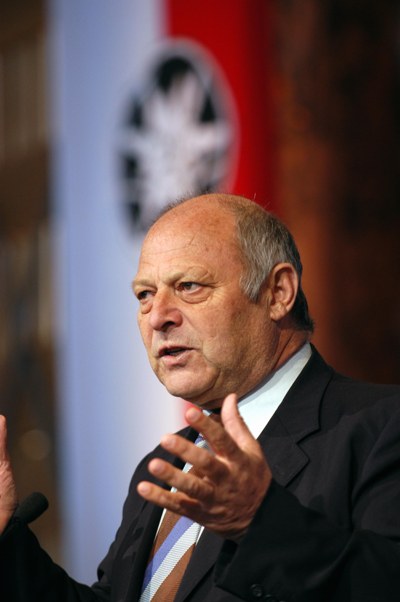Il Presidente della FUEV, Hans Heinrich Hansen, accompagnato dalla vicepresidente Martha Stocker, ha incontrato a Bolzano il 7 gennaio 2008 il presidente della Provincia Luis Durnwalder e si è informato della situazione locale della minoranza tedesca e di quella ladina, in maniera particolare per ciò che riguarda la tutela dell’uso della propria madrelingua (Vedi comunicato stampa della Provincia).

L’incontro fra Hansen e Durnwalder
La Fuev (in Ingese Fuen: Federal Union of European Nationalities) è una organizzazione che così descrive i propri obiettivi nel proprio Statuto :
The object of the FUEN is to preserve national and regional characteristics, languages, cultures and the rights of ethnic groups as a whole and their members in particular, and also to create an internationally recognised code of rights of these ethnic groups.
Nonostante in passato si siano registrate critiche anche feroci nei confronti di questa organizzazione ( si veda per esempio: Zendron e la Interrogazione 5764/97 in Consiglio Provinciale a Bolzano, la Regione Trentino Alto Adige sostiene anche finanziariamente la Fuev con una quota di 30.000 Euro all’anno (vedi la relativa delibera del 2006).
Sfogliando la documentazione in rete, ho comunque trovato un testo decisamente interessante dal titolo: The Right to Education for the Autochthonous, National Minorities in Europe. Si tratta di una serie di punti discussi e poi approvati al termine del 52esimo congresso annuale Fuen, che si è tenuto a Tallin, in Estonia, dal 16 al 20 maggio 2007. Riporto il paragrafo secondo me più rilevante:
INTEGRATION OF THE MAJORITY POPULATION
To comply with one of the education objectives from the legal documents – stimulating tolerance, dialogue and understanding – it is necessary in the education systems not only to teach knowledge about the culture, language, history, religion and traditions
amongst the minority, but also amongst the majority population. The application of the right to education thus includes both the minority as well as the majority population.
1. The education system of a state must teach knowledge about the minorities that live in this state also to the majority population, in particular through the subjects of history, economics/politics, art, music and literature.
2. E Education systems must comply with the requirements of the society of today. The intercultural perspective in the curricula is required to create interaction between persons belonging to minority and majority and to stimulate the development of the own identity and to ensure understanding for other identities.
3. The learning of the minority language by the majority population living in the area of settlement of a minority must be aimed at, so that the majority also can use the advantages of early bi- and multilingualism.
4. A condition for this is an appropriate language policy, which encourages to learn the minority language.
In definitiva, ci dice la Fuen, la tutela delle minoranze in Europa passa anche attraverso azioni di integrazione linguistica delle maggioranze, attraverso l’adozione di una prospettiva multiculturale, lo sviluppo del bi-multilinguismo precoce e la messa a punto di adeguate politiche linguistiche.
Tutte cose che in Sudtirolo sembrano essere tiepidamente considerate, se non a volte addirittura ostacolate. Peraltro a Bolzano manca del tutto l’idea che il multilinguismo possa essere sostenuto attraverso l’adozione di strategie linguistiche consapevoli, definite sul piano della progettazione politica. Molto, dice spesso lo stesso Durnwalder, dipende dalla buona volontà dei cittadini, mostrando così un chiaro atteggiamento prepolitico su tale argomento.









